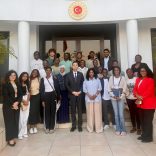Mozambique: New case of mpox diagnosed in Maputo province
Study: Frelimo received more press coverage in last Mozambique elections

File photo: DW
A monitoring report on media coverage in the 2018 municipal elections conducted by the Centre for Interdisciplinary Communication Studies (CEC) shows that Frelimo got 34.7% coverage, against Renamo’s 29.3% and the MDM’s 28.9%, the remaining 7.1% going to other parties and civic movements.
“Frelimo had by far the most coverage; journalists paid more attention to covering Frelimo’s campaign activities,” executive director Maria Mangueleze said.
Urban centres with greater coverage
The study also indicates that the main urban centres, such as Maputo, Matola, Beira and Nampula, were more prominent in media coverage, followed by provincial capitals, while Class C cities and small towns, even those close to urban centres, registered low levels of overage.
“The coverage was also limited in the analysis of the campaign speeches of the candidates and the competing parties. Citizens’ voices occupied less than 1% of the articles analysed. The electoral process involves other players, like citizens, the voters in this case, and we want to know how citizens feel about their candidates, how they are receiving the information disseminated by the candidates in relation to their promises,” Mangueleze said.
In response, Frelimo spokesman Caifadine Manasse said that the electoral law established the steps to be followed regarding air time for political parties competing during the elections.
“I do not have here with me any data that could lead us to believe that Frelimo was actually given more time, to the detriment of other parties. It is true that Frelimo has been working harder in the electoral campaign, trying to get more exposure, and that is probably the reason for the conclusion reached,” Manasse said.
Discrimination in treatment
Renamo spokesman José Manteigas felt that the monitoring report validated the opposition’s complaints about media discrimination in the treatment of political parties, especially during elections. The study, he said, ought to “help media outlets and the directorates of these bodies fight for professional ethics and accuracy, and above all the respect that should be given to all political parties as actors at the same level”.
Commented on the results of the report on journalistic coverage of local authorities, Secretary General of the National Union of Journalists Eduardo Constantino said that, “while we do not have administrative power over the media, we do have powers of persuasion, to help us avoid situations that could lead to us being considered in violation of the electoral code of conduct”.












Leave a Reply
Be the First to Comment!
You must be logged in to post a comment.
You must be logged in to post a comment.